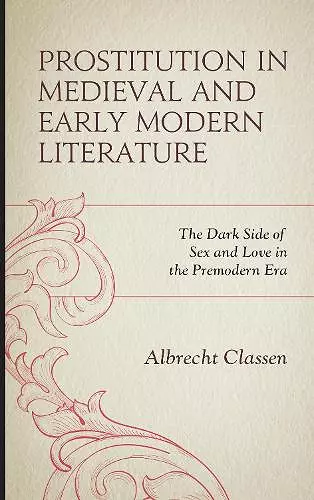Prostitution in Medieval and Early Modern Literature
The Dark Side of Sex and Love in the Premodern Era
Format:Paperback
Publisher:Bloomsbury Publishing PLC
Published:4th Jun '21
Currently unavailable, and unfortunately no date known when it will be back
This paperback is available in another edition too:
- Hardback£90.00(9781498585804)

Prostitution is known as the oldest profession in the history of humanity. While historians have already given due consideration to the profession’s social and cultural meanings across time periods, little has been written about literary representations of prostitution. Prostitution in Medieval and Early Modern Literature analyses the work of writers from an array of social positions, including courtly poets and even religious writers, dealing with the topic during the medieval and early modern periods. Its study shows that prostitutes and brothel owners were present on the literary stage far more often than we might have assumed. Utilizing an interdisciplinary approach and incorporating relevant sources from across the entire European continent dating from the early Middle Ages to the sixteenth century, it examines the phenomenon of prostitution in a variety of contexts and highlights the extent to which the institution mattered for both the higher and the lower classes.
In Prostitution in Medieval and Early Modern Literature: The Dark Side of Sex and Love in the Premodern Era, Albrecht Classen builds on the considerable work of cultural historians on the subject of prostitution by focusing on literary discussions of the topic. The appearance and treatment of the phenomenon in literary texts attest to the fact that prostitution was a salient topic for artists and the discourse surrounding it was not limited to the Church or other authoritative institutions. In examining a wide-range of works from Germany, France, and Spain, Classen finds that not all authors portray prostitution in a negative light. This study shows that although criticism of prostitution is present, the subject was also treated satirically or as a way to challenge dominant concepts of morality and ethics. -- Connie L. Scarborough, Texas Tech University
A living legend of literary scholarship, Albrecht Classen is justly famed not just for his prolific output but for adhering to the highest standards of writing and reasoning, as well as unprejudiced openness to all things that touch on the human. With the same thoroughness and uncompromising precision of his prior work, he tackles, in this volume, the thorny matter of the representation of prostitution by medieval and early modern authors, including Hrotsvit of Gandersheim, Christine de Pizan, Oswald von Wolkenstein, François Villon, and Fernando de Rojas, and in genres like the fabliau, mæren, and Schwänke. One of Classen's central findings is that such representations make evident that prostitution was not just an aspect of premodern and early modern literary discourses, but a ubiquitous practice throughout western Europe. Concerned with mentalities and their history, Classen notes how such discourses expose ambiguous subjectivities that could not entirely dissociate themselves from what they branded as unquestionably immoral and despicable. An awareness of complicity emerges then from these discourses and hints at the troubled conscience of a western European culture inextricably entangled with the objectification, commodification, and exchange of the sexualized human body. Begotten at the intersection of unmet needs and a lack of alternatives, however, prostitution may in fact be a fundamental aspect of human existence under conditions of scarcity and wealth maldistribution, so much so that, as Classen suggests, "we could easily write the entire history of Western (and probably also Eastern) civilization in terms of prostitution." Stressing that "sex sells" and that "without demand there is no supply, both in past and present," Classen thus lays the problem of prostitution, like the unwanted offspring of a forbidden act, at the very doorway of the economy where money rules and constitutes the only undisputed value. This book is of particular importance as it comes at a time of heightened awareness of human trafficking and its relations to a global economy where human chattel/capital is subordinated to profit, and where the immorality of the sale of the body clashes with its inescapable necessity. -- Fidel Fajardo-Acosta, Creighton University
In this engaging and well-documented volume, Albrecht Classen provides a broad survey of the depiction of prostitution in European literary works from the tenth to late sixteenth century. This illuminating investigation demonstrates how the marginalized and much maligned prostitute plays a surprisingly prominent role in the works of both male and female authors, both famous and obscure, in a broad range of genres. This extensive portrait of the prostitute should provide ample fodder for those wishing to enhance further their knowledge of this shadowy profession during the premodern era. -- Stacey Hahn, Oakland University
ISBN: 9781498585828
Dimensions: 220mm x 151mm x 18mm
Weight: 372g
244 pages